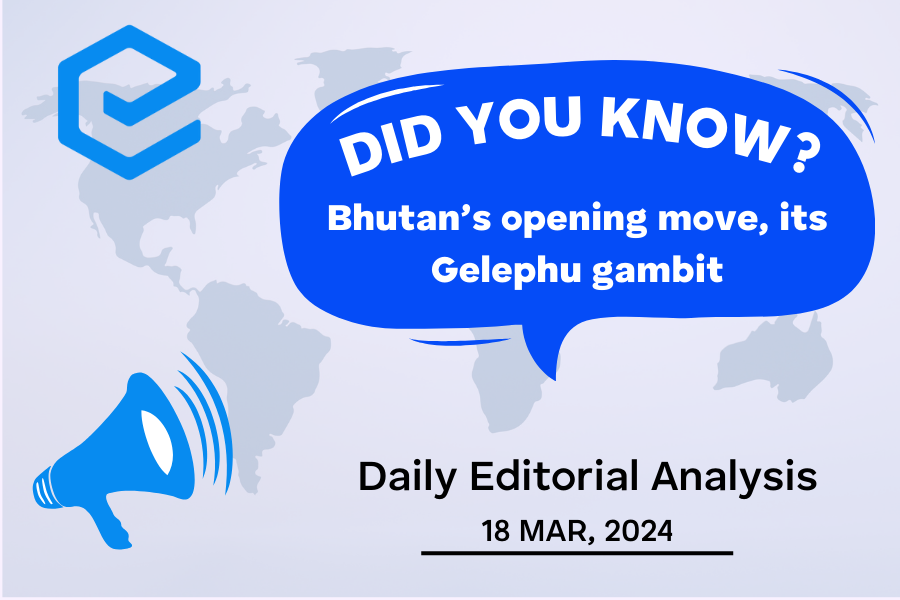
Bhutan’s opening move, known as the Gelephu gambit, signifies a strategic shift in the country’s diplomatic playbook. By prioritizing the development of the Gelephu region, Bhutan aims to bolster its economic ties and diversify its partnerships beyond its traditional reliance on India. This move reflects Bhutan’s evolving foreign policy, seeking to balance its historical ties with India while also pursuing greater autonomy and engagement with other regional and global players. The Gelephu gambit underscores Bhutan’s determination to assert its sovereignty and navigate a complex geopolitical landscape in pursuit of its national interests.
Tag: GS – 2 India and its Neighbourhood, Bilateral Groupings & Agreements, Groupings & Agreements Involving India and/or Affecting India’s Interests
Contents
In News:
A recent article explores Bhutan’s plan to create a regional economic center in Gelephu, a town adjacent to Assam in India. It discusses the project’s importance as a risk for Bhutan but potentially game-changing for the area, especially with India’s backing.
Debate Surrounding the Development of Gelephu Mindfulness City (GMC)
Arguments in Favor
- Carbon-Neutral City Concept
- Gelephu aspires to be a carbon-neutral city, housing non-polluting industries like IT, education, and healthcare.
- It aims to attract investment and position itself as a health and wellness hub, akin to planned cities like Neom and Nusantara.
- Strategic Connectivity
- Gelephu’s location at the intersection of India’s “Act East” policy and emerging connectivity plans to ASEAN and the Indo-Pacific region is significant.
- It aligns with initiatives like the India-Middle East-Europe Economic Corridor and Trilateral Highway, enhancing lateral land-based connectivity.
- Bilateral Benefits for Bhutan
- The project complements Bhutan’s infrastructural goals and offers opportunities for future integration with initiatives like the India-Middle East-Europe Economic Corridor.
- It addresses challenges such as tourism expansion, youth employment, and geopolitical pressures, including negotiations with China.
Arguments Against
- Geographical Challenges
- Gelephu’s unique geography presents obstacles, including high rainfall and flooding during monsoon seasons.
- Wildlife corridors and landlocked status pose further challenges for infrastructure development and trade.
- Security Concerns
- Historical insurgencies in neighboring northeastern states and Myanmar raise security concerns.
- Past military operations, like Operation All Clear, highlight potential risks to stability.
Significance of the Gelephu Project
- Bhutan’s Socio-Economic Objectives
- Promoting tourism and employment opportunities are vital aspects of Bhutan’s development strategy.
- Gelephu serves as a potential solution to address geopolitical pressures while fostering controlled international engagement.
- India’s Role and Regional Cooperation
- India’s support for the Gelephu project strengthens bilateral ties and regional connectivity.
- It aligns with India’s infrastructure plans and energy cooperation initiatives, facilitating mutual benefits.
Recommendations for Strengthening Regional Ties
- Seeking Common Ground
- India should prioritize regional cooperation, acknowledging shared cultural, geographical, and economic ties.
- Examples from successful engagements with Sri Lanka and Bangladesh offer valuable lessons for fostering goodwill.
- Promoting Digital Infrastructure
- Collaboration on digital infrastructure and STEM initiatives can enhance economic integration and educational opportunities across South Asia.
- Projects like the Third International Internet Gateway demonstrate the potential for broader regional cooperation.
- Environmental Sustainability
- India and Bhutan must prioritize environmental sustainability in bilateral relations.
- Cooperation in preserving natural resources and promoting sustainable development is essential for long-term prosperity.
Conclusion
Bhutan’s vision for the Gelephu Mindfulness City epitomizes its aspirations for sustainable growth and connectivity. Despite challenges, the project underscores the deep-rooted ties between India and Bhutan and their shared commitment to regional progress. Through strategic cooperation and sustained efforts, both nations can navigate complex dynamics and achieve mutual prosperity in the region.
Source: TH
Frequently Asked Questions (FAQs)
Q: What is Bhutan’s Gelephu gambit?
A: Bhutan’s Gelephu gambit refers to the strategic decision to prioritize the development of the Gelephu region as a means to enhance economic growth and diversify diplomatic relations beyond its traditional ties.
Q: Why is Bhutan focusing on Gelephu?
A: Gelephu, strategically located in southern Bhutan, offers significant economic potential due to its proximity to India and its potential as a hub for trade and investment. By developing Gelephu, Bhutan aims to stimulate economic growth and reduce dependence on its historical ally, India.
Q: How does the Gelephu gambit impact Bhutan’s foreign relations?
A: The Gelephu gambit signals Bhutan’s intention to pursue a more independent foreign policy by expanding its engagement with other countries beyond India. This move opens avenues for Bhutan to forge new economic and diplomatic partnerships while maintaining its long-standing relationship with India.
Q: What are the key challenges associated with Bhutan’s Gelephu gambit?
A: One of the main challenges is ensuring sustainable development in Gelephu while preserving Bhutan’s unique cultural and environmental heritage. Additionally, Bhutan must navigate geopolitical complexities to avoid any strain on its relationship with India while expanding its international engagements.
Q: How does the Gelephu gambit align with Bhutan’s national interests?
A: The Gelephu gambit aligns with Bhutan’s overarching goal of promoting economic growth, diversifying its economy, and asserting its sovereignty on the global stage. By investing in the development of Gelephu, Bhutan seeks to enhance its self-reliance and strengthen its position in regional and international affairs.
In case you still have your doubts, contact us on 9811333901.
For UPSC Prelims Resources, Click here
For Daily Updates and Study Material:
Join our Telegram Channel – Edukemy for IAS
- 1. Learn through Videos – here
- 2. Be Exam Ready by Practicing Daily MCQs – here
- 3. Daily Newsletter – Get all your Current Affairs Covered – here
- 4. Mains Answer Writing Practice – here

